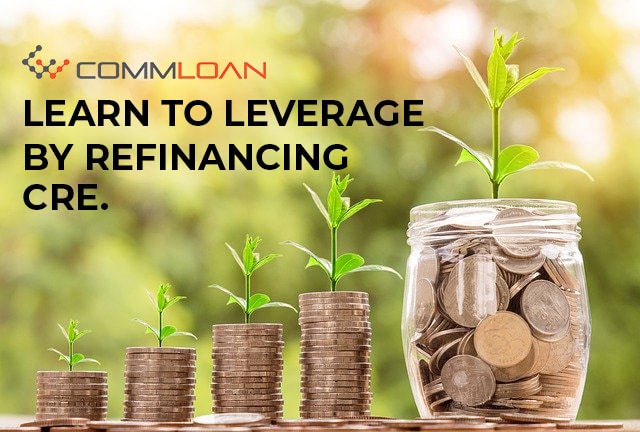Maximize Your Investment with Commercial Loan Refinance

Ultra-high net worth investors understand the fundamental value of cash flowing commercial real estate. They know that real estate is finite and there’s only so much to go around. They also know that streams of passive income will build empowerment over their time, and ultimately makes them financially free. Everyone starts somewhere and no one starts out as a millionaire. Wealth is built over time. The wise investor knows that they need to maximize their returns by using all the tools available to them.
Once you’ve acquired income producing commercial real estate (a topic for another day), you’ll want to constantly increase the revenue and reduce your expenses. This generates a higher net operating income and therefore increases the market value of the property. Doing this consistently over time will result in a real “bang for your buck” because it gives you cash flow and increases your net worth. There can be significant tax benefits too, but that topic is also for another time.
The Power of Financing or Leverage
One of the important tools in the successful investor toolbox is financing. The power of financing, or leverage, gives you the ability to acquire more property and build value faster. How?
By increasing your buying power. Depending on your property type and several other factors, for each dollar you invest, you can borrow 1.6 to 1.8 times that amount. So, with $250,000 you can potentially buy a $1,000,000 property. Let’s say you did that and bought a $1 million dollar property using $750,000 in financing. Your original loan is at a pretty good rate of 4.5%. Can you improve?
Calculate the details of your loan effortlessly with commercial mortgage calculator.
Maximizing Your Return with Financing
Let’s say, for our discussion, that a portion of the funds you borrowed were used to improve the property, which lead to increased revenue. Another great achievement is that you’ve cut unnecessary expenses.
Now, let’s revisit the financing. Your loan of $750,000 at a 4.5% interest rate for a 10-year term and 20-year amortization results in a monthly payment of $4,744.87. At the end of the 10-year term, the payoff balance will be $457,829.34. You have excellent cash flow and the property pays for itself.
Answer a few questions and get custom mortgage quotes. We'll match you with offers from our network of 650+ lenders.
Interest Rates and Amortization
Shopping and negotiating for the best terms will save you money and help build your wealth. If you lowered the interest rate to a fixed rate 3.5% and increased the amortization to 25 years, your monthly payment would be $3,754.68 and the balloon payment at the end of the loan would be $525,215.85.
The difference between the two loans in monthly payments is $990.19, multiplied by the 120 payments of the loan term that comes to $118,822.80. That’s money you get to keep instead of paying the lender. This means that the better terms of the lower interest loan result in a return on your investment that is 47.5% greater!
The Balloon Payment or Cash-Out
The trade off to extending the amortization period by 5-years results in a higher balloon payment, even with the lower interest rate, of $525,215.85. Let’s go back to the things you did right – increasing revenue and decreasing operating expenses.
That means you’ve continued to build the market value of the property and at the end of the 10-year loan term, the property should be worth more than you initially paid at acquisition. You can avoid the balloon payment with multiple strategies, one option is by selling the property and taking the profits.
An even better strategy would be to refinance the property and existing mortgage, potentially releasing equity (your initial cash investment plus value you’ve created) in the property. This is often called a cash-out refinance. You can use those funds for additional property acquisitions or to make more improvements to the property.
Cash-out refinance loans are typically a little more conservative than acquisition loans or loans that only refinance existing debt and transaction costs. However, commercial real estate cash-out loans are a regular tool of the high net worth successful investor to grow their wealth.
Be sure to pay close attention to the terms of your new loan if you’re using the cash-out funds to acquire a new property, in addition to the new terms on the existing property being refinanced. In either case, build a portfolio of multiple properties by leveraging the value you create in cash flowing properties and maximizing your financing tools.
More Financing Details
Refinancing has the potential to save you a lot of money and increase your overall return. I provided a relatively simple illustration earlier in this article. Make sure you consider underwriting, legal and due diligence costs associated with the financing as well. Similar to comparing the broad terms (interest rate, amortization, loan-to-value, and term), you also need to evaluate the transaction costs, which will slightly differ by lender.
The transaction costs may include origination fees, underwriting, processing, legal, title, recording, third party costs for appraisal, inspection, survey, and any environmental testing. You will want to inquire about the lender’s process, timeline and other unique aspects of each lender. If you’re not a seasoned pro, it’s okay to bring on a loan broker to help make sure you’re getting the best terms.
This is yet another high net worth investor practice; they don’t spend their time calling dozens of lenders and comparing commercial real estate loan quotes, they engage a trusted broker/advisor to do that work for them. As demonstrated in the analysis earlier, this ultimately pays off in the return on investment.
Lender Selection
When evaluating lenders, there are a significant number of variables that you need to consider. Many offer standard, federal or state loan programs, while others have unique programs tailored to fit certain property types or borrowers they want to engage as clients. There are different types of lenders in the marketplace including banks, credit unions and private money lenders (to name a few).
Picking a lender is like picking a partner and you will want to make sure you are both aligned. Property location, type, loan size, borrower history, net worth, liquidity, and many other factors need to be considered. You might be surprised how many lenders are trying to compete for your loan. Don’t just go to the ones with the biggest marketing and advertising departments. Smaller lenders often have more flexibility in negotiating terms when compared to larger institutions. Generally speaking, lenders evaluate the risk profile of a property and borrower. Lower risk means better terms.
Wrapping It Up
Refinancing your commercial loan is a great way to save money, make improvements or increase the return on the investment, depending on how you look at it. You can use leverage to improve properties or cash-out to acquire new assets and build your portfolio. Make sure to pay close attention to how your business plan aligns with the lender and loan terms.
Knowing current interest rates, lender program offerings and your credit profile will all help in selecting the right lender that will work best for your specific situation. High net worth investors often incorporate cash flowing commercial real estate into their portfolio and often engage trusted advisors to identify and help negotiate the best financial structure to their advantage.
If you want to search for the best alignment with a lender, get the best terms, explore your opportunities or if you are just getting started, consider using CommLoan. CommLoan is an all in one platform that lets you compare lenders and terms with ease. They empower the borrower with market knowledge and make lenders compete for your business. Get started with your free, no obligation financing quote today.

